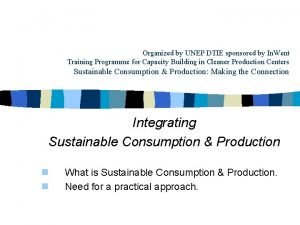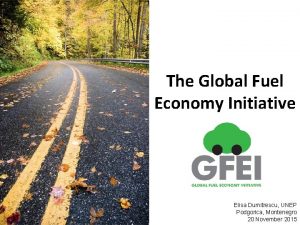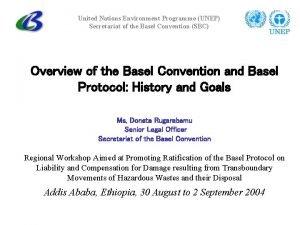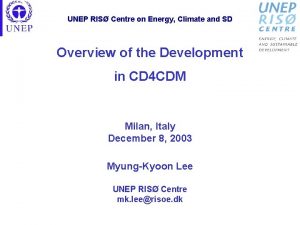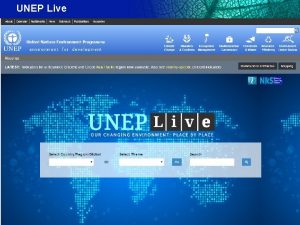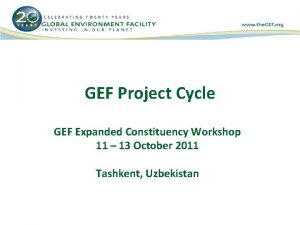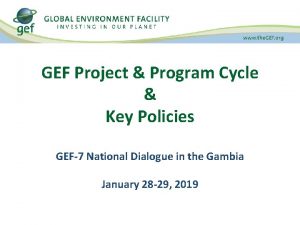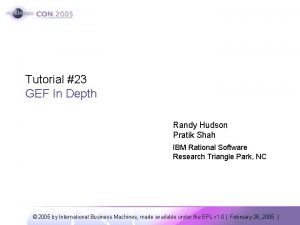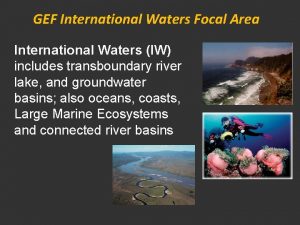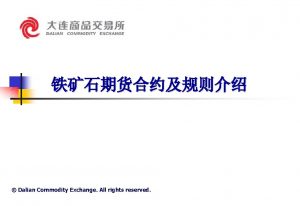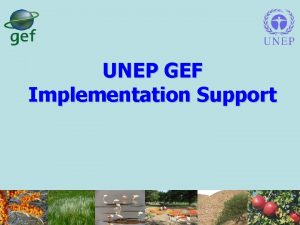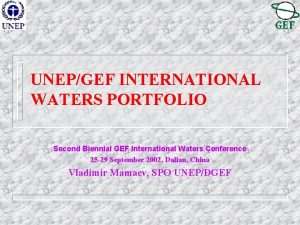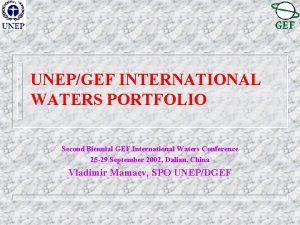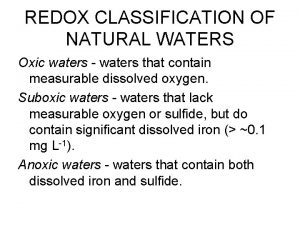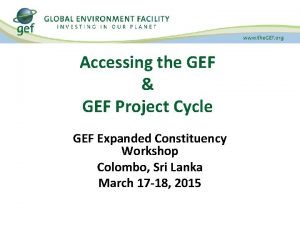UNEP GEF International Waters Portfolio Progress since Dalian











- Slides: 11

UNEP GEF International Waters Portfolio Progress since Dalian and Lessons Learned Vladimir Mamaev, SPO UNEP/GEF

UNEP GEF IW Portfolio • As at June 2005 the UNEP IW Portfolio consist of 35 projects with GEF grant funding of $124 million and total funding of $261 million. • The portfolio comprises 21 full size projects, 7 medium-sized projects and 7 projects under development with project preparation and development (PDF) grants. • These include six full size projects implemented jointly with one or more of the other GEF implementing agencies.

Full Size Projects approved since Dalian • Addressing Land-based Activities in the Western Indian Ocean (WIO-La. B), 8 Countries US$ 4, 511, 140. • Addressing Transboundary Concerns in the Volta River Basin and Is Downstream Coastal Area, 6 Countries, US$ 5, 719, 880. • Integrating Watershed and Coastal Areas Management in Small Island Developing States of the Caribbean. (co-implemented: UNEP, UNDP 7, 270, 450). • Combating ) - 13 Countries, US$ 13, 382, 691 (UNEP- $coastal area degradation and living resources depletion in the Guinea Current LME through regional actions. (co-implemented: UNDP, UNEP) – 15 Countries US$ 20, 812, 404 ( UNEP - $9, 099, 699). • Strengthening Global Capacity To Sustain Transboundary Waters: The International Waters Learning Exchange and Resource Network (IW: LEARN), Operational Phase. (coimplemented with UNDP and WB) – FSP- Global, US$ 6, 350, 000 (UNEP– 1, 491, 534).

Medium Size Project Approved since Dalian • Promoting Ecosystem-based Approaches to Fisheries Conservation and LMEs, Global, US$ 995, 000. • Fostering a Global Dialogue on Oceans, Coasts, and SIDS, and on Freshwater-Coastal-Marine Interlinkages, Global, US$ 995, 000. • Dissemination of Experiences and Lessons Learned in the water Resources management across Latin America and the Caribbean's (DELTA)

Project Concepts approved since Dalian • Strategic Partnership for the Mediterranean Large Marine Ecosystem – Regional Component: Implementation of agreed actions for the protection of the environmental resources of the Mediterranean Sea and its coastal areas (jointly with WB). • Atlantic and Indian Ocean SIDS Integrated Water Resource and Wastewater Management (jointly with UNDP). • Implementing Sustainable Integrated Water Resource and Wastewater Management in the Pacific Island Countries (jointly with UNDP).

Lessons learned Implementing capacity building activities South China Sea • capacity building extends from financial management, through project organization, management and administration, to technical issues. • Internship training for focal Ministries to gain understanding and familiarity with project management and reporting procedures and increased awareness of UNEP and GEF practices. GIWA • A need to have a Project Document that is less prescriptive and has more room for contingencies, to allow more time for testing the methodologies in the field before full implementation begins, and to give more emphasis to capacity building with a view to building more sustainable regional expert networks.

Lessons learned (cont. ) Improving financial, institutional sustainability Mediterranean • Use of the existing Institution for project execution, rather then creating a new ones. South China Sea • Use of regional consultants/experts and institutions. • Cooperation with the South East Asian Regional Centre for START (Sys. Tem for Analysis, Research and Training Programme) – GIS. Bermejo • Full integration into national policies, a comprehensive bottom approach, extensive public participation, are success parameters for achieving outstanding products and ensuring long term sustainability once the GEF project is over.

Lessons learned (cont. ) Promoting replicability (e. g. through demonstrations). Pantanal • Potential replication of Demo projects in the context of the Plata Basin. • Replication of TDA/SAP methodology in the Amazon basin. South China Sea - DEMONSTRATION SITE SELECTION PROCESS. • Clear separation between the scientific and technical, and the political issues and processes. • Site selection process fully transparent, developed from the bottom upwards. • Process wholly owned by the stakeholders, with no “external” influence.

Lessons learned (cont. ) Multi-stakeholders Participation San Juan • Several public participation workshops (nationals and binationals) have been held for consultation throughout the SAP formulation process. More than 70 participants and 140 people interviewed, respectively. Sao Francisco • 217 public events were held in the course of the project with 190 local consultants, 1, 248 collaborators, and 12, 097 attendees representing a total of 404 federal, sate and municipal institutions, NGOs and eth private sector. Pantanal • The project triggered a successful public and stakeholder mobilization in the basin. A total of 116 public events involved more than 4, 530 participants representing a total of 258 federal, state, and municipal institutions, NGOs, and private enterprises.

Lessons learned (cont. ) Project Implementation South China Sea • Memoranda of understanding with Specialized Executing Agencies. • MANAGEMENT FRAMEWORK – best M&E practice. • DECISION MAKING PROCESS - Project Steering Committee composition. • TRACKING IN-KIND CO-FINANCING – increase ownership. GIWA • Difficult to find competent Megaregional hosts. • Needed more training, supervision and coordination than originally anticipated. • Increase the Core Teams capability to provide supervision and backstopping, including participation in report writing, to the subregional teams.

Thank You
